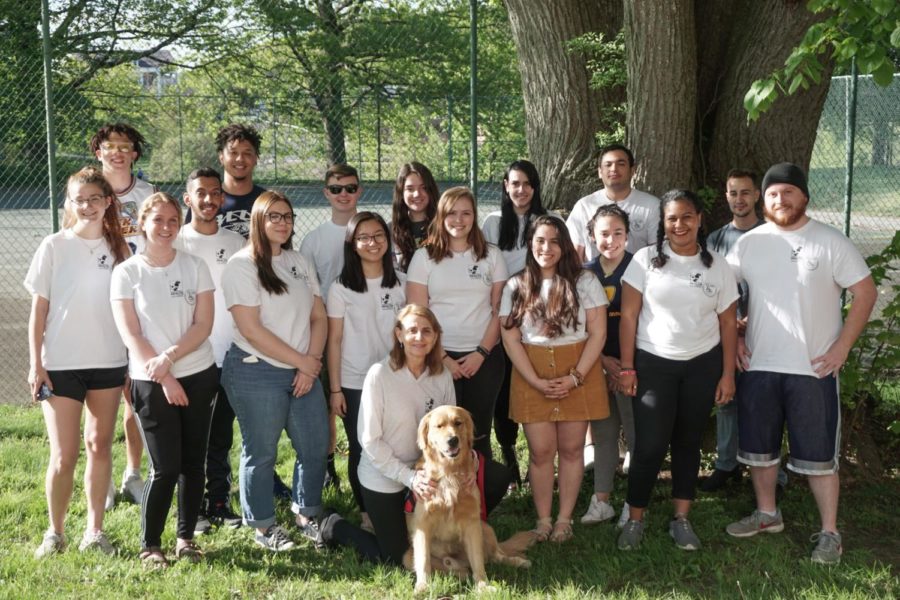Paw-some Opportunity to Learn Canine Consideration
Dr. Singleton, Pawfessor Spirit, and the students in the spring 2019 Canines Assisting in Health course.
Pawfessor Spirit is Pace’s first canine professor and is even receiving student evaluations this year.
In 2016, Dr. Joanne Singleton, along with Lu Picard, co-founder of the Connecticut organization Educated Canines Assisting with Disabilities (ECAD), developed Canines Assisting in Health. This is an educational opportunity aimed at College of Health Professions (CHP) majors, but open to all in learning how to properly provide patient care to people with service dogs.
Across the United States, there are more than 56 million people with visible and invisible disabilities. Many of these people might have a service dog or get one in the future. Dr. Singleton became aware of the challenges this group faces when she met Luis Carlos Montalvan while receiving health care. Montalvan is a disabled veteran, and Tuesday is his service dog and ECAD alum.
“When it comes to those of us with service dogs, healthcare providers tend to be reactive as opposed to proactive,” Montalvan told Dr. Singleton toward the beginning of their work together.
After realizing that she had never received education in providing healthcare to people with service dogs, Dr. Singleton pursued a certificate in Animals and Human Health from the University of Denver’s Graduate School of Social Work, Institute for Human-Animal Connection. Also, she went for a certificate for her work with service dogs through ECAD. Simultaneously, she began to work on the Canines Assisting in Health program.
Dr. Singleton is joined by the four-legged Pawfessor Spirit, an ECAD alum and cousin of Montalvan’s dog Tuesday, to help teach students about this underrepresented aspect of healthcare.
“The course is intended to be fun, and they learn much of the content through observing my interactions and then their own interactions and planned activities with Pawfessor Spirit,” said Dr. Singleton. “We also take a field trip to ECAD, and they get to spend a day surrounded by and interacting with service dogs in training.”
Andrea Alicea, a junior nursing major in the course, enjoyed the field trip to ECAD.
“Being able to see the process that goes into training a service animal genuinely blew my mind, as they train these dogs to do everything, and I mean everything,” said Alicea. “They train them on how to act while on a plane, in the subways, how to open dryers and turn off light switches, to pressing handicap buttons. Being able to see how they do all this gave me a further appreciation for what these dogs can do.”
People in health professions and beyond are likely to have to interact with people with service dogs in professional settings where they will need to know how to act. The Americans with Disabilities Act allows service dogs to go everywhere that people are allowed. Dr. Singleton’s course tackled this challenge in a setting outside of healthcare.
“I have gained so many experiences from this course such as being able to work with service dogs in training, working with emotional support animals, and most importantly work for the greater good of the community,” said Alicea. “Part of this course we went into town and discussed with shop owners to see how the community could better support service animals and make a more accessible town for everyone. Dr. Singleton worked on a sticker that shops and restaurant owners could post on their doors that would show their support for those who required service animals. Although services animals are legally allowed any place that a human is allowed, having these stickers further showed their support to those who need them.”
Dr. Singleton and Pawfessor Spirit’s work in educating students has been important in ensuring that people with service dogs are provided the same high-quality healthcare that other people are provided. Pawfessor Spirit received his first faculty evaluation in spring 2019. He was given a positive review.
“To be proactive one has to have knowledge, and that knowledge provides a foundation to advocate for and interact in a culturally competent way with individuals with disabilities teamed with service dog, as well as those who participate in animal assisted interventions to support their care,” Dr. Singleton said. “This is essential to providing quality patient care. To understanding the rights of those teamed with service dogs given to them through the Americans with Disabilities Act. To understanding the human-animal bond, the different types of assistance animals, the indications for service dogs, and animals assisted interventions, and the benefits, the health and welfare needs of the dogs, and so much more.”
Your donation supports independent, student-run journalism at Pace University. Support the Pace Chronicle to help cover publishing costs.

